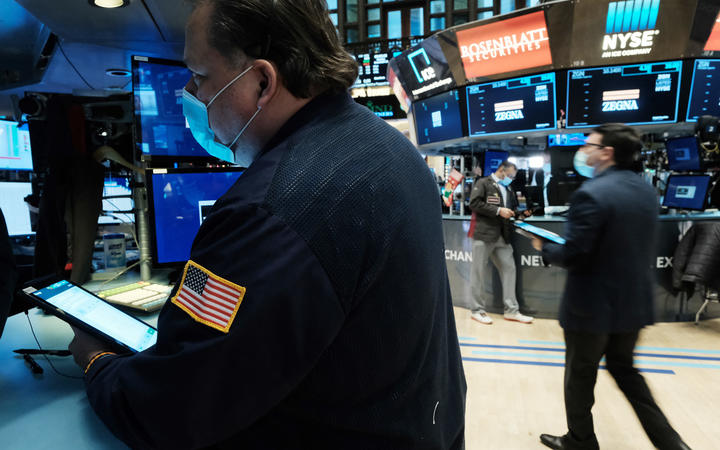A local retail investor is warning about the risks of buying shares in Chinese companies listed on US stock exchanges following the delisting of a major firm.
 A trader works on the floor of the New York Stock Exchange (NYSE) on 20 December 2021. Photo: AFP / 2021 Getty Images
A trader works on the floor of the New York Stock Exchange (NYSE) on 20 December 2021. Photo: AFP / 2021 Getty Images
Chinese ride-sharing giant Didi recently announced it was delisting from the New York Stock Exchange (NYSE), with some analysts saying it was bending to Chinese regulators angered by its share float in the US earlier this year.
Growing political tensions between China and the US had also seen American authorities ban US entities from trading shares in companies that are believed to be controlled by the Chinese military.
The decision by Didi to delist prompted concerns other Chinese companies may follow its lead.
Chinese stocks feature on the NYSE as securities known as American Depositary Receipts (ADR), which allows foreign companies to access US markets without the cost of a direct listing.
Local investor Jono Griffiths bought stakes in Chinese companies through the online platform Sharesies, and feared he might be forced to sell his holdings at a discount price when these companies were seeing record growth if they delisted.
“My main issue is that although Sharesies is essentially a stockbroker, they consider themselves as more of a stock facilitator (meaning they don’t offer financial advice) which I am okay with.”
But Griffiths said he thought Sharesies should be warning people that Chinese stocks come with certain risks.
“They are a New Zealand company and I believe they have an obligation to protect there members and investors.”
He reiterated that he was a big fan of Sharesies because it had made investing more accessible and had allowed him to set up an account on behalf of his sons.
Sharesies’ head of investments Gus Watson said out of its 500,000 customers about 5000 owned shares in Chinese firms listed on the NYSE.
He said companies delisted all the time for various reasons, and in this case there were three options available to investors.
They could sell their shares in their own time, Shareseis could sell on their behalf at the best possible price, or possibly transfer their shares out of the Sharesies platform, he said.
Watson said it did not have a specific warning on its platform about the risks of investing in Chinese companies but noted the wider risks associated with investing in ADRs.
“We look to outline the different risks for different products, and one of the risks we do outline with ADRs is a geo-political risk.”
The Sharesies website states that ADRs are subject to foreign exchange risks, fees and cancellation, with the latter allowing the foreign company to terminate its ADR, which would remove its from the US exchange.
